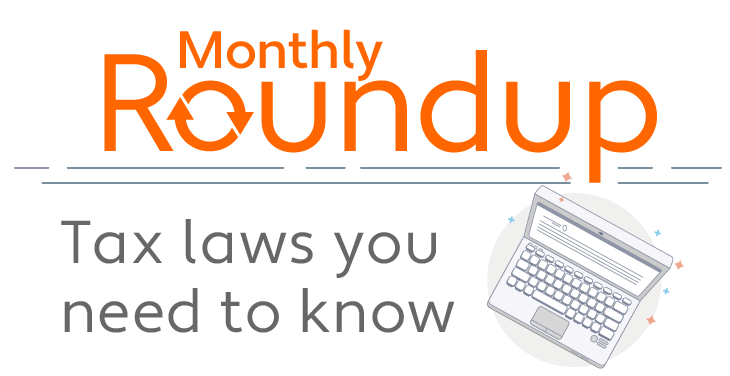A Primer on Drop Shipping and Sales Tax Exemptions (Part 1)
Sometimes a company will accept orders for a product it doesn’t actually stock. Instead of investing upfront to own and warehouse the item, the company waits until the product is purchased. It then buys the item from a third party, such as a wholesale warehouse or manufacturer, and directs that company to ship directly to the customer. In the eyes of the customer, the original seller was the one who provided the goods—even though it was a separate supplier who stocked, packaged and delivered it.
If this sounds familiar, your business is in a drop shipment relationship. Drop shipments are becoming an increasingly common method for omnichannel retailers and eCommerce companies to fulfill online orders and move products quickly from state to state.
Drop shipping can be the basis for a very lucrative business model. However, this arrangement can become very complex from a sales tax compliance perspective. The parties involved have some complicated questions to answer:
Which jurisdiction gets to collect the sales tax on a product that’s drop shipped from one state to another? Which company is responsible for collecting those taxes? Does resale make the drop shipment exempt from sales tax altogether? If so, how should the transaction be documented to ensure compliance and minimize audit risks?
To answer these questions and others like them, you’ll first need to understand which role your company plays in the drop shipment relationship.
Defining the Drop Shipment Relationship
Generally speaking, there are three parties involved in every drop shipment relationship. There’s the seller (who accepts an order), the supplier (who delivers, or “drop ships,” it) and the end customer (who may be unaware that drop shipping is taking place).
If you are the seller, this typically means you’ve accepted an order from a customer for an item you do not have in stock. You then place that same order with a manufacturer or other supplier to have it drop shipped on your behalf. You pay the supplier and bill the customer.
If you are the supplier, your business is the one accepting orders for resale. This might be through a partnership with an eCommerce company or an agreement with a multi-channel retailer. Upon receiving an order, you package and ship the goods to the seller’s customer but send the bill to the seller.
If you are the customer, well, you probably aren’t reading this post. An end customer simply makes a purchase, pays the seller and waits for a package to arrive. A customer is often unaware when drop shipping is taking place since the receipt and packing slip that arrives with the delivered goods is usually from the seller, not the supplier.
Drop shipping is used by sellers and suppliers of all sizes, down to solopreneurs who handcraft artisanal products and sell them through bigger retailers. Amazon, Etsy, eBay and Shopify all have guidelines or policies on drop shipping.
Drop Shipping and Sales Tax Nexus
From a sales tax perspective, each drop shipment consists of two sales. One is the transaction between the seller and the customer. The second is between the seller and the drop ship supplier.
For each of these transactions, yet another relationship comes into play: the one that ties the seller and supplier to states through nexus. While each state takes its own approach to this term, nexus is generally defined as a “presence” in a state that’s significant enough to require a business to comply with the state’s sales tax laws.
Sales tax nexus can become very complex for companies that deliver goods to multiple states, but for now we'll take a look at a simple scenario:
Let’s say you are a retailer headquartered in New York. The physical presence of an office means your company has nexus in the state. When a customer who is also located in New York makes a purchase, you will be responsible for collecting sales tax from the customer regardless of how the purchased goods are delivered.
But what happens when you use drop shipping to deliver the same item to a customer located in North Carolina? In this case, you may not have nexus—but your supplier might. The drop shipper would then be responsible for collecting the sales tax from you (the retailer).
That is, unless you can provide the drop shipper with a valid resale exemption certificate.
Drop Shipping and Sales Tax Exemptions
Any time a drop shipment transaction is exempted from sales tax, the company responsible for those taxes will need to carefully collect, verify and store a valid certificate so the tax-free transaction can be justified in the event of an audit. Often the end customer will also claim a sales tax exemption, in which case another exemption certificate will need to be collected from the person or entity buying the product.
By now, you are probably gaining clarity on what role your company plays in the drop shipment relationship. That’s step one.
Step two is understanding how your role in the relationship is defined in each state so you can remain sales tax compliant.
If you are feeling overwhelmed by the complicated nature of drop shipping, you’re not alone. Drop shipments are among the most complex aspects of sales and use tax law. Even the most experienced sellers and suppliers find it difficult to keep track of state nexus definitions and exemption certificates!
Stay tuned for upcoming posts in this series. I will be covering disparate state rules and drop shipment exemption certificates in more detail, as well as steps to help companies remain audit-ready.

The Avalara Tax Changes midyear update is here
Trusted by professionals, this valuable resource simplifies complex topics with clarity and insight.
Stay up to date
Sign up for our free newsletter and stay up to date with the latest tax news.













